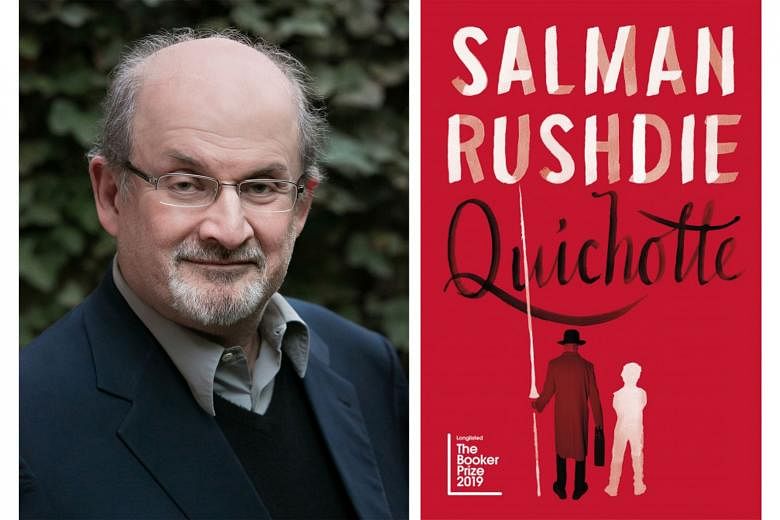FICTION
QUICHOTTE
By Salman Rushdie
Jonathan Cape/390 pages/ $30.98/Books Kinokuniya
3.5 stars
Is this the real life? Is this just fantasy? Quichotte, Salman Rushdie's entertaining metafictional novel, muddies the waters between fiction and reality.
The eponymous hero of the story is an elderly, TV-addled pharmaceutical salesman who falls for a celebrity and goes on a picaresque quest across America to seek her hand. Quichotte - pronounced key-shot in French, key-shot-uh in German, key-sho-tay in Italian - is as quixotic as his name suggests.
Rushdie, a celebrated storyteller known for his 1981 masterpiece Midnight's Children, weaves plenty of colour and humour into this novel - his 14th - which has made it to this year's Booker Prize longlist. But other hallmarks of Rushdie-ism loom large too, such as a proclivity for overwrought writing, which drags the story down.
The protagonist, 70-year-old Quichotte, decides he must pass a series of trials - "valleys", as he calls them - before he can be deemed worthy of her love.
Wishing upon a star, he manages to magick a teenage son into being. Or so he thinks - like so much else in the story, the boy is merely a figment of his imagination.
Sancho, the Pinocchio to Quichotte's Geppetto, joins the hero on his quest. The chapters on their exploits are interspersed with ones concerning "Sam DuChamp", the ostensible author of the story who is estranged from his sister and son.
The novel is a kaleidoscopic jumble of pop culture references from Project Runway to Gattaca to Disney to The Wizard Of Oz.
The plot sometimes feels like a sliced-and-diced mishmash of news you might find on your social media feed - mass shootings, ethics of big pharma and apocalyptic fantasies.
The idea is to hold up a mirror to the fragmented world of fake news, "alternative facts" and nightmarish politics, which can sometimes feel too awful to be true.
Eventually, life and art turn into each other and the lines between DuChamp and the duo are increasingly blurred. So are the lines between Rushdie and his characters.
Everywhere in the novel are shadows of the real-life author himself, who is around Quichotte's age and has a name similar to that of his hero's love interest, Salma R.
But to what direction do these metafictional conceits tend?
Rushdie's novel can feel frustratingly involuted. The idea may be to evoke the sense of an echo chamber or a wilderness of mirrors - exemplifying, perhaps, the insularity and narcissism of people in society.
Unfortunately, this isn't enough to stop the reader from wishing that the author had a few better tricks up his sleeve.
If you like this, read: Midnight's Children (Vintage, $20.95, Books Kinokuniya), Salman Rushdie's dazzling magical-realist novel about a young man born at the precise moment of India's independence.


